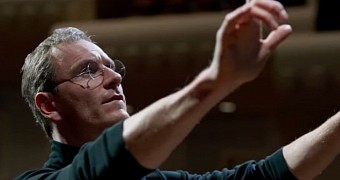The Danny Boyle-directed “Steve Jobs” movie is already getting Oscar buzz, even though it’s days from wide release, but it’s also drawing criticism for the liberties it takes in portraying Apple’s co-founder Steve Jobs.
Based on a script by Aaron Sorkin (“The Social Network”), inspired by Walter Isaacson’s best-selling biography, “Steve Jobs” is disputed both by Jobs’ widow Laurene Powell and Apple’s Tim Cook. Powell, for instance, fought hard to block the movie from coming out, even calling Leonardo DiCaprio and Christian Bale, attached as leads at various stages in the production, to urge them to back out of it.
Their reason was a sound one: this was a biopic that embellished and flat-out manufactured events, while pretending to stay true to reality.
The thing is, Sorkin tells the LA Times, even though about the life of a real person, the film still is a work of fiction and should be treated as such.
“‘Steve Jobs’ doesn't fall into the same genre [as other fact-based films]. It’s not meant to be a dramatic re-creation of actual events. At the end of the day, it’s much more a movie about genius versus decency and fathers and daughters. It’s a much more universal movie than the history of Apple.”
The publication describes this new breed of biopic, where writers and directors take artistic liberties others wouldn’t have dared to take before, the “impressionistic biopic.” It’s a sub-genre that allows moviemakers the best of both worlds: the wide appeal that comes with claiming to tell the story of a huge public figure, and the artistic freedom to make it into an entertaining piece of art.
We’ll see if “Steve Jobs” sits well with the millions of Jobs’ fans / supporters.

 14 DAY TRIAL //
14 DAY TRIAL //